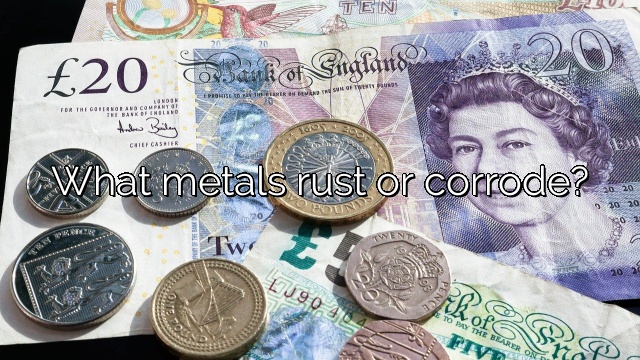Iron. Iron will rust very quickly. If iron is allowed to get wet and exposed to air noticeable brown rust can develop in
Aluminum. Aluminum is also mined out of the ground as an oxidized compound called Bauxite. Aluminum oxide takes a
Copper. Copper rusts from its metallic natural brown shade to a bright green. Rusted Copper is
Technically, only iron and alloys that contain iron can rust. Other metals, including precious metals like gold and silver, can corrode in a similar way. What sets certain metals apart, is the duration of time it takes for them to begin rusting or corroding.
Biden Fires Warning Shot for Retirees ... Are You at Risk?
What causes different metals to rust
Electrolyte and connection of two components The electrolyte is basically a good solid conductive solution that facilitates the flow of electrons between the anode and cathode.
Electrical connection between components Electrical contact between metals can be important for the occurrence of bimetallic corrosion.
Sufficient potential difference between two materials
What metal has the ability to rust
Technically, only ferroalloys and the idea with iron content can rust. Other mining crops, including precious metals such as gold and silver, can corrode in the same way. What tears some metals apart is the time it takes for them to corrode or corrode. Here are some of the most common metals and how they resist wear and corrosion.
Do THIS Or Pledge Your Retirement To The Democrats
What types of metals do not rust
Metals that do not rust Aluminum. Aluminum cannot rust.
Stainless Steel Stainless steel is another product made from a metal that won’t even rust.
Cink Steel. Galvanized steel is technologically a coated material, but it is worth mentioning here.
copper, brass and bronze. For this reason, copper, brass and bronze do not rust like aluminum.
They don’t melt rust, but…
What are some different metals that rust
Rust occurs after decay, while tarnish and patina continue to develop as a result of oxidation.
Another difference between these three processes is that corrosion is caused by moisture and air, while tarnishing and patina are caused by exposure to oxygen alone.
Brass, copper, aluminum, silver and, consequently, some other metals are subjected to hardening.
More parts
Which metals rust and which don t
Aluminum. Aluminum is an extremely common and therefore versatile metal that does not break down as it does not contain the iron found in some specific alloys.
Copper. Copper is a natural metal, a substance in which it is found in its pure metallic form.
Brass.
Bronze.
Cink Steel.
Stainless steel.
What materials forms rust
Rust, a well-known example of corrosion, usually results from the breakdown of metallic iron. The reactants of this chemical are reactions with iron, water, and oxygen, and the product is usually hydrated iron oxide, better known as rust.
What metals rust or corrode
Corrosion, on the other hand, is used as a general key term to describe the deterioration of consumables through chemical or electrochemical reactions. While rust only occurs in the form of iron and iron-based alloys, corrosion can penetrate almost any metal.
ALERT: Secret IRS Loophole May Change Your Life


